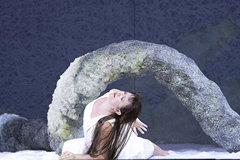| Opera Reviews | 6 May 2024 |
The Vienna State Opera's new Rusalka impresses both musically and dramaticallyby Moore Parker |
|
| Dvorak: Rusalka Vienna State Opera 26 January 2014 |
|
|
Despite the impressive cast, the laurels on this occasion have to go the State Opera Orchestra and their conductor, Jiri Belohlavek. Throughout, an impressively refined and passionate reading (in uncut form) cushioned the staging and its protagonists on a silver platter, and served the work's composer unfailingly in detail and style. In the title role, Krassimira Stoyanova brought a generous palette of assets to Rusalka - linguistically, in psyche and in vocal timbre - combining an ample portion of lyricism with sufficient tonal edge to ride the orchestra where required. Her famous "Song to the Moon," was impeccably delivered, and the choreographed physical development of the character as the piece unfolded was skillfully portrayed. Ideally, the role may call for a greater measure of youthful esprit and charm in order to rank as optimal, but the evening ranks nevertheless as an unquestionable triumph for the Bulgarian soprano. Michael Schade's Prince (also rather on the mature side) met with less applause than one might have expected for a local favourite - possibly due to a lack of warmth and romance in an otherwise solid reading. Indeed, the reading pales when pitted against Piotr Beczala's stage presence and honeyed tone in Salzburg's 2008 Summer season. In contrast, Günther Groissböck received a thrilling reception for his virile and vocally imposing Water Goblin - indeed a fine performance in all respects. Janina Baechle has just the right physique and spine-chilling air for (director) Sven-Eric Bechtolf's foreboding Jezibaba. Her black-feathered attire and collection of dead ravens well-imaged the character's dark soul and evil intent. A manipulator who satisfies her own - and the the Nymphs - desires with no less than the Kitchen Boy's blood. As the Foreign Princess, Monika Bohinec presented a strikingly ruthless figure - particularly intense in stage presence and utilizing the combination of a naturally dark lower register and a rather brilliant upper extension to powerful effect. Quite possibly an Ortrud, Kostelnicka, or even an Abigaille or Lady Macbeth in the making. Stephanie Houtzeel guaranteed for a vocally mellifluous and truly boyish Kitchen Boy, who - together with Gabriel Bermudez' well sung macho-muscled Forester - approached a black-humoured Laurel and Hardy parody in exploits which ultimately end in the Boy's tragic demise. The three Nymphs were delightful - whether gyrating in perverted lust, or vocally serenading in perfect harmony. Credit to Lena Belkina (2 Nymph), Ilseyar Khayrullova (3 Nymph) and to Valentina Nafornita (1 Nymph), whose luscious soprano showed definite promise as a future contender for the title role in the work. No fairy-tale setting, this reading spotlights sexuality - desired, repressed - and to some degree, openly expressed, as in Lukas Gaudernak's cleverly choreographed Act 2 ballet, which sardonically depicts the straightjacketed gender roles in fin de siècle Western society. Rusalka is here a floundering virgin, whose restricted gait is liberated with the awakening of her sexual freedom. The set (Rolf Glittenberg) consists of six grey stone-coloured rooms on two levels for Acts 1 and 3, with an Act 2 switch to a one-level central zone in red featuring a large rear cut-out for the background forest elements. Atmospheric lighting (Jürgen Hoffman) often casts strikingly magnified shadows while opaque glass walls reveal back-lit figures and images, hinting at the meanderings of the subconscious mind. One of several ancient tree trunks - crystal-encrusted and almost human-like in its contortions - ultimately claims the Prince at the close of Act 3 when bound together by Rusalka's black ream of cloth. Marianne Glittenberg's stylishly period costumes echo the work's original era - a setting which Bechtolf intentionally chose to parallel developments at the time in psychoanalysis and the publication of Sigmund Freud's famous Traumdeutung. Bechtolf establishes vibrant characters who act in sympathy with Dvorak's score, lending harmony and an interesting perspective - if not the magical romance of Vienna's 1987 premier State Opera presentation - to a production which will hopefully endure fashion and fickle taste, and further serve this neglected work in years to come. |
|
| Text ©
Moore Parker Photo © Wiener Staatsoper / Michael Pöhn |

 In
keeping with current fashion, the reception on this premier evening
was a healthy Viennese mixture of bravos and boos for the production,
with some surprises in store for the soloists' reception beforehand.
In
keeping with current fashion, the reception on this premier evening
was a healthy Viennese mixture of bravos and boos for the production,
with some surprises in store for the soloists' reception beforehand.






